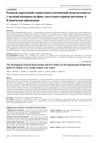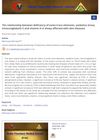 2 citations,
November 2022 in “Frontiers in Pharmacology”
2 citations,
November 2022 in “Frontiers in Pharmacology” Local healers in Addis Ababa use 81 medicinal plants, mainly from the Asteraceae family, to treat skin and general diseases, with Echinops kebericho being an endangered plant important in their practices.
 1 citations,
June 2022 in “Zagazig Veterinary Journal/Zagazig Veterinary Journal (Online)”
1 citations,
June 2022 in “Zagazig Veterinary Journal/Zagazig Veterinary Journal (Online)” Alopecia in dogs is often caused by mange, flea and tick infestations, and nutritional deficiencies, especially in males and young dogs.
 4 citations,
April 2012 in “Asian-australasian Journal of Animal Sciences”
4 citations,
April 2012 in “Asian-australasian Journal of Animal Sciences” Red deer antler extract may help hair grow faster by increasing a growth protein.
1 citations,
April 2022 in “Applied sciences” Bitter melon extract may help prevent hair loss and can be used in cosmetic products.
 5 citations,
February 2011 in “Expert Opinion on Drug Discovery”
5 citations,
February 2011 in “Expert Opinion on Drug Discovery” We need better treatments for hair loss, and while test-tube methods are helpful, they can't fully replace animal tests for evaluating new hair growth treatments.

Keratin hydrogels from human hair show promise for tissue engineering and regenerative medicine.
6 citations,
May 2023 in “International journal of molecular sciences” Collagen-enhanced mesenchymal stem cells significantly improve skin wound healing.
 139 citations,
February 2014 in “Journal of Advanced Research”
139 citations,
February 2014 in “Journal of Advanced Research” Vitamin D is important for skin health and may affect conditions like psoriasis and hair loss, but more research is needed to understand its role fully.
52 citations,
May 1982 in “The American journal of the medical sciences” Vitamin A toxicity likely caused the patient's high calcium levels.
39 citations,
January 1991 in “Oncology” High-dose vitamin A was safe and well-tolerated in a lung cancer treatment study.
32 citations,
January 2006 in “Liver transplantation” Vitamin A toxicity can cause severe health issues and may require a liver transplant if other treatments fail.
20 citations,
June 2020 in “Journal of Advanced Research” High-dose vitamin A and E with zinc improved blood sugar control and insulin function in diabetics, but may cause hair loss.
20 citations,
February 1977 in “The anatomical record” Excess vitamin A changes skin and hair follicle development and affects polysaccharide distribution.
 18 citations,
October 2014 in “Experimental Biology and Medicine”
18 citations,
October 2014 in “Experimental Biology and Medicine” Eating vitamin A affects hair growth and health by changing cell signals in mice.
18 citations,
October 1978 in “The journal of investigative dermatology/Journal of investigative dermatology” Excess vitamin A causes lasting gland changes in mouse hair follicles.
14 citations,
July 2022 in “Nutrients” Vitamin A is important for healthy skin and hair, influencing hair growth and skin healing, but UV light reduces its levels.
7 citations,
May 2012 in “Journal of veterinary diagnostic investigation” Some young Angus cattle had skin problems due to not enough vitamin A, which got better after they were given more vitamin A.
 6 citations,
February 2021 in “Frontiers in Cell and Developmental Biology”
6 citations,
February 2021 in “Frontiers in Cell and Developmental Biology” Eating too much or too little vitamin A can cause hair loss.
3 citations,
March 1956 in “Journal of morphology” Vitamin A is essential for healthy skin and normal hair growth.
 2 citations,
September 2023 in “Scientific reports”
2 citations,
September 2023 in “Scientific reports” The nanocomposite films with vitamins and nanoparticles are promising for fast and effective burn wound healing.
 2 citations,
August 2023 in “Ecotoxicology and environmental safety”
2 citations,
August 2023 in “Ecotoxicology and environmental safety” Vitamin A helps rabbit skin cells grow and survive heat stress.
 1 citations,
February 2022 in “Terapevtičeskij arhiv”
1 citations,
February 2022 in “Terapevtičeskij arhiv” A young woman got liver damage from taking too much vitamin A for two years.
 September 2024 in “Meditsinskiy sovet = Medical Council”
September 2024 in “Meditsinskiy sovet = Medical Council” Excessive vitamin A intake can cause eye damage, but recovery is possible with proper treatment.
 October 2022 in “Deleted Journal”
October 2022 in “Deleted Journal” Long-term low-dose Vitamin A intake may cause increased brain pressure.
 September 2020 in “Benha Veterinary Medical Journal”
September 2020 in “Benha Veterinary Medical Journal” Sheep with skin diseases often have lower levels of certain trace elements and vitamin A, and higher oxidative stress and immunoglobulin E levels.
May 2020 in “Current developments in nutrition” Vitamin A affects the resting phase of hair growth, with both low and high levels increasing the number of hair follicles in this phase.
 April 2017 in “The FASEB Journal”
April 2017 in “The FASEB Journal” Eating more vitamin A changes hair growth-related proteins in mice, affecting hair cycle stages.
 May 2024 in “Endocrine practice”
May 2024 in “Endocrine practice” Vitamin A toxicity can cause serious health issues like hypercalcemia and is often overlooked.
May 2023 in “International journal of molecular sciences” The ABCA4 gene protects hair follicle stem cells from toxic vitamin A byproducts.
Vitamin A during pregnancy can harm fetal skin development.















